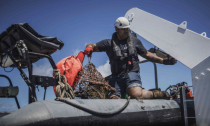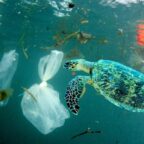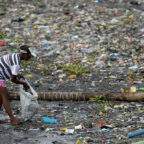
Discarded nets, lines and other fishing gear make up a significant portion of plastics polluting the world’s oceans, according to a new report from Greenpeace. The report on so-called “ghost gear” says such debris makes up about 10% of all plastic pollution in oceans, and in some areas accounts for the majority of large plastic waste at sea.
The fishing industry has turned to using more gear made of plastic in recent decades because it is lighter and cheaper, according to the report.
“The impact of abandoned or lost fishing gear has increased dramatically as the industry has switched from natural fibers, ceramic pots and wood buoys to plastic,” John Hocevar, Oceans Campaign Director for Greenpeace USA, said in an article on the organization’s website. “Together, plastic fishing gear and single use plastic packaging make up the bulk of debris in our oceans.”
Six percent of all nets used, 9% of all traps 29% percent of all longlines end up left behind in the water, according to Greenpeace. Each year, the weight of fishing gear dumped in the oceans equals 50,000 double decker buses.
Greenpeace has long campaigned against the fishing industry and collateral effects on marine life.
“Fishing gear can be lost by accident or abandoned at sea deliberately. Once there, nets and lines can pose a threat to wildlife for years or decades, ensnaring everything from small fish and crustaceans to endangered turtles, seabirds and even whales,’ the report says. “Spreading throughout the ocean on tides and currents, lost and discarded fishing gear is now drifting to Arctic coastlines, washing up on remote Pacific Islands, entangled on coral reefs and littering the deep sea floor.”
Large marine life can be trapped in the discarded gear and be injured or die. A pregnant minke whale was recently found dead and tangled up in an abandoned fishing net on a Scottish island. Last year, 300 endangered sea turtles were found dead in fishing nets off the coast of Mexico.















Social Profiles